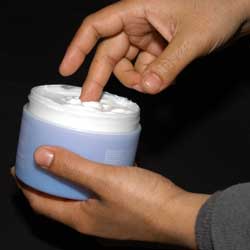|
Is there truth behind the science used to sell skincare products?
by Alom Shaha
One of the few places we regularly see science on TV these days is in adverts for cosmetics. They‚€™re filled with pretty graphics showing you how the active ingredients work and feature lots of complicated words like ‚€œactive liposomes‚€Ě and ‚€œboswelox‚€Ě (which seems to be a word invented solely for the purpose of selling a face cream). I‚€™m a big fan of the L‚€™Or√©al adverts: they always have a gorgeous woman, like Rachel from Friends, telling you to pay attention to the ‚€œscience‚€Ě and a recent one even had Eva Longoria saying: ‚€œI love it when they talk science‚€Ě. It‚€™s unlikely that Jennifer Aniston or Eva Longoria is ever going to date a physicist, but a boy can dream. Scientific terminology is used extensively to market skincare products but is the science featured in these adverts reliable? Is it worth spending more money on a particular brand of face cream and, as a bloke, should I buy products designed for men?
According to Professor Andrew Finlay of the Department of Dermatology at Cardiff University, there is no point forking out lots of money for a designer-branded product rather than a generic brand. Hywel Williams, Professor of Dermato-Epidemiology at Nottingham University conceded that some products may be better than others in terms of being more comfortable, having a nicer smell and being less likely to give allergic responses but it‚€™s all a matter of personal taste.
In the name of research, I visited a cosmetics counter at a department store where the resident skincare expert advised me to cleanse, tone and moisturise my skin. Unlike professors Finlay or Williams she wasn‚€™t a dermatologist, but I believed her when she told me that cleansing and moisturising might be useful. However, she couldn‚€™t explain exactly why I should tone my skin and I wasn‚€™t convinced that it did anything useful. I was not alone: Prof. Williams later told me that he had also never understood what toning the skin means. Nina Goad, press officer for the British Skin Foundation, told me that toners are generally not necessary. They were originally designed to supplement the effectiveness of cleansers, however most modern cleansers are effective on their own and do not require the use of a toner. So that‚€™s at least one product that seems to be completely unnecessary, despite what the lady at the cosmetics counter told me.

Feels soft, but how are the ingredients actually affecting my skin?
Photo by Anwar Khan
|
More and more products seem to be enriched with additional ingredients like vitamins and boswelox that are supposed to be absorbed through your skin. It‚€™s well-established that a lack of vitamins in your diet can be bad for your skin, but there is little evidence to suggest that applying vitamins directly to the skin is useful, even though some substances can be absorbed through the skin, like nicotine in nicotine patches. Ben Goldacre, a medical doctor who also writes the Bad Science column in The Guardian newspaper says that skincare companies are really good at making pseudo-scientific claims. They‚€™ll say, in technical terms, that vitamin E and collagen are essential for the cross-molecular structure of whatever without making any claim that the specific ingredient will have any effect on your skin. While the added ingredients may be useless, simple moisturisers are useful because they do what they say on the tin: they add moisture to the skin. Basically, all of these creams add water to the cells in the outer layer of your skin which plumps them up and makes the skin look and feel smoother. This is a temporary effect, so you have to keep applying it.
In addition to marketing the ingredients in skin creams, major designer brands also market ranges for men. According to the L‚€™Or√©al website, men‚€™s skin is significantly different from women‚€™s, and thus needs to be treated and cared for in a significantly different way. Prof. Finlay disagrees, telling me that there is not a big difference between male and female skin and that in his opinion, moisturisers are only labelled as male or female for marketing reasons. Prof. Williams says that there are subtle biological differences in male and female skin, for example, blood vessel responses in the skin, susceptibility to irritants and possible ultraviolet burning, but not big differences that would require a different type of moisturiser. Of course, there is one big difference: men tend to have more facial hair than women and shaving can cause irritation and dryness. But according to Nina Goad, a moisturiser that is designed for women will still be effective for men with dry skin.

Female skin products probably work equally well on men's skin and vice versa.
Photo by Anwar Khan
|
I did receive one consistent piece of advice from the scientists I contacted as well as from Nina Goad of the British Skin Foundation: they all agreed that protecting your skin from the sun was important. Her most important piece of advice for both men and women was to protect their skin from the sun. Ultraviolet rays cause wrinkles and creases, mainly because the radiation makes collagen break down at a higher rate than it would naturally with age. The good news is that more and more moisturisers now include sun protection, usually by means of a chemical ingredient that either blocks or absorbs UV radiation, and that‚€™s the one ingredient that‚€™s worth looking out for when buying a face cream.
|
